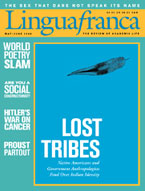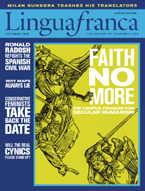Some highlights of Lingua Franca in 1999:
 In our May/June issue, Peter Beinart's "Lost Tribes" examines the vexed question of what counts as a real Indian tribe. Facing bomb threats and lawsuits, a small band of government anthropologists employs academic theory in an effort to fashion practical solutions to multicultural paradoxes. In "The Sex that Dare Not Speak Its Name," contributing writer Emily Nussbaum tells the story of one of America's most interesting social causes: the hermaphrodites' rights movement. She explains how the leaders of the movement have pursued alliances with academic gender theorists even as they have battled an often hostile medical establishment. Also in the issue, we give a witty take on "the year of writing about Proust," and we profile new academic books on Nazi cigarette-policy and the notion of "social construction" -- books that would later attract attention in The New York Times, The Atlantic Monthly, and elsewhere.
In our May/June issue, Peter Beinart's "Lost Tribes" examines the vexed question of what counts as a real Indian tribe. Facing bomb threats and lawsuits, a small band of government anthropologists employs academic theory in an effort to fashion practical solutions to multicultural paradoxes. In "The Sex that Dare Not Speak Its Name," contributing writer Emily Nussbaum tells the story of one of America's most interesting social causes: the hermaphrodites' rights movement. She explains how the leaders of the movement have pursued alliances with academic gender theorists even as they have battled an often hostile medical establishment. Also in the issue, we give a witty take on "the year of writing about Proust," and we profile new academic books on Nazi cigarette-policy and the notion of "social construction" -- books that would later attract attention in The New York Times, The Atlantic Monthly, and elsewhere.
 In the September issue, Laura Secor's "Testaments Betrayed" gives a meticulous account of a crucial and neglected Balkan story: how some of Yugoslavia's most admired intellectuals played a significant role in the breakup of their country. Secor's piece received considerable attention in Eastern Europe and was translated into Serbo-Croatian, appearing in serialized form in an opposition newspaper in Belgrade. Scott McLemee tells the fascinating story of Ayn Rand's posthumous career; as young scholars examine her life, they find that the fiercely dogmatic novelist was a proto-feminist or even a Russian revolutionary. Not all Randians are pleased.
In the September issue, Laura Secor's "Testaments Betrayed" gives a meticulous account of a crucial and neglected Balkan story: how some of Yugoslavia's most admired intellectuals played a significant role in the breakup of their country. Secor's piece received considerable attention in Eastern Europe and was translated into Serbo-Croatian, appearing in serialized form in an opposition newspaper in Belgrade. Scott McLemee tells the fascinating story of Ayn Rand's posthumous career; as young scholars examine her life, they find that the fiercely dogmatic novelist was a proto-feminist or even a Russian revolutionary. Not all Randians are pleased.
 Our October issue shines new light on the secular humanist movement and its growing presence on college campuses. Emily Nussbaum profiles a group of college activists who employ parody and polemic in their battle against organized religion. Have they struck a blow for free expression or succumbed to their own version of group think? A profile of historian Ronald Radosh enters the disputed terrain of cold war history, detailing the provocative arguments Radosh will make in a forthcoming book on the Spanish civil war. (These arguments would later be featured in a New York Times Magazine cover story). Other articles relate how the novelist Milan Kundera has been shortchanging his readers with faulty translations and how a conservative foundation has been funding antifeminist women's magazines on campuses around the country.
Our October issue shines new light on the secular humanist movement and its growing presence on college campuses. Emily Nussbaum profiles a group of college activists who employ parody and polemic in their battle against organized religion. Have they struck a blow for free expression or succumbed to their own version of group think? A profile of historian Ronald Radosh enters the disputed terrain of cold war history, detailing the provocative arguments Radosh will make in a forthcoming book on the Spanish civil war. (These arguments would later be featured in a New York Times Magazine cover story). Other articles relate how the novelist Milan Kundera has been shortchanging his readers with faulty translations and how a conservative foundation has been funding antifeminist women's magazines on campuses around the country.





